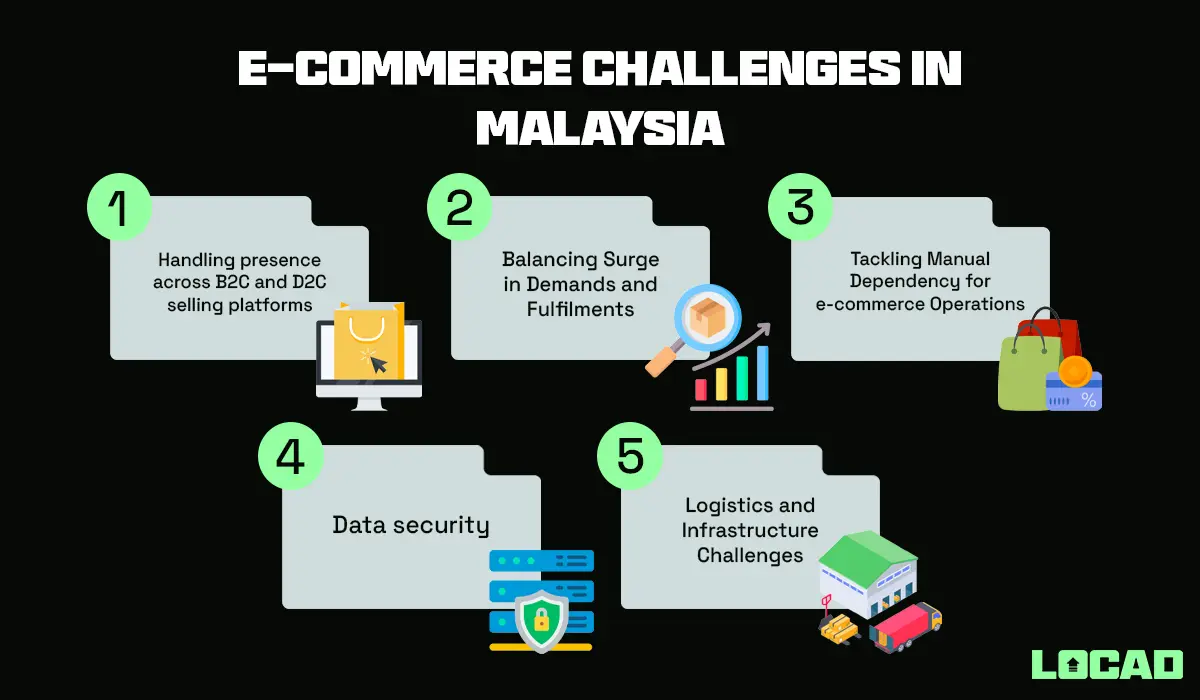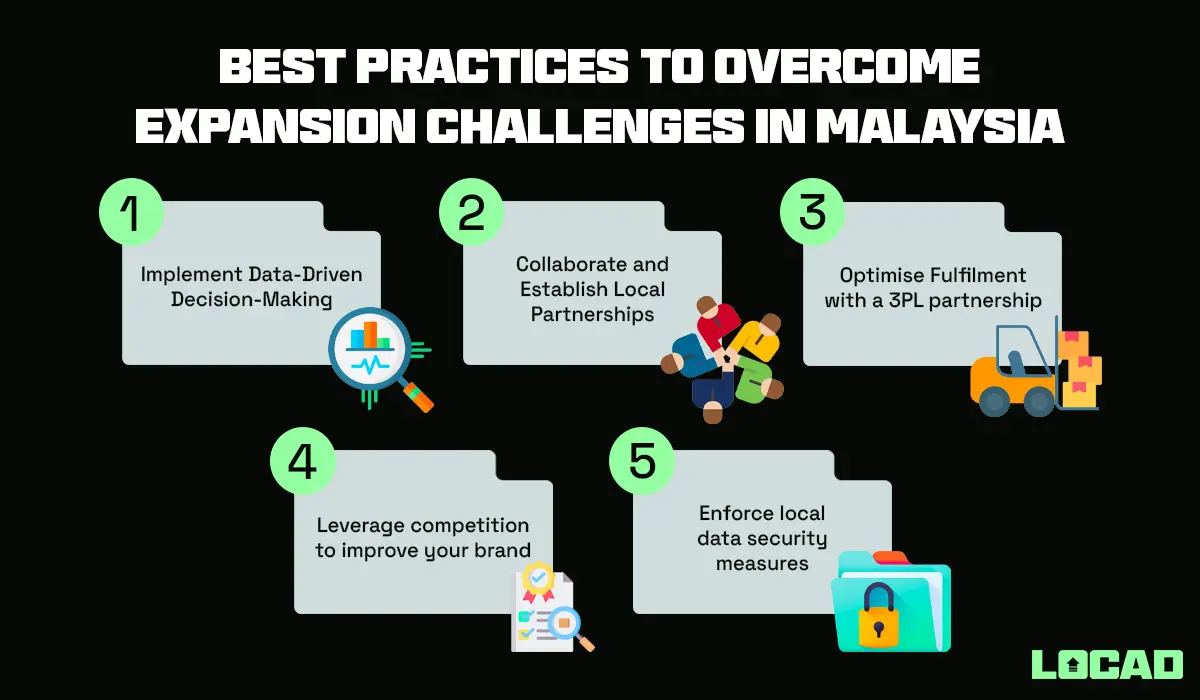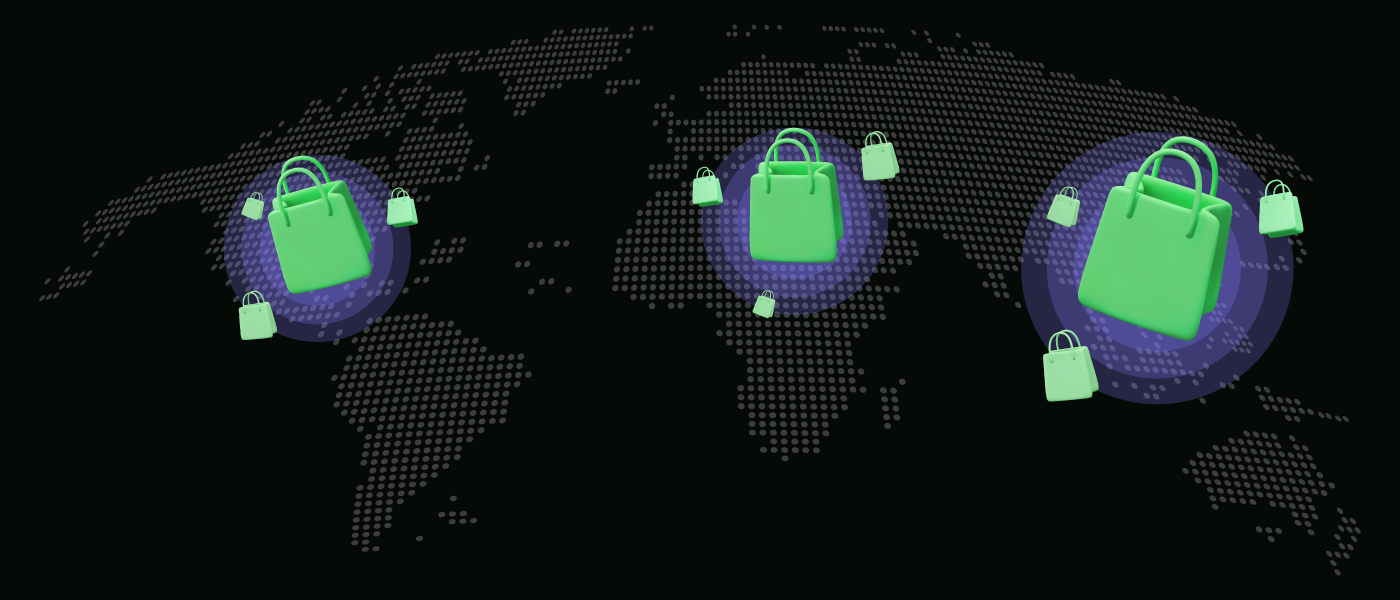The e-commerce scene in Malaysia has witnessed exponential growth in recent years, positioning the country as one of the most promising markets in the region. According to recent reports, the e-commerce market in Malaysia contributed an 8.7% global growth rate in 2023, with a potential to cross US$13,799.0 million by 2027.
The steady growth can be attributed to the increasing internet penetration, rising disposable incomes, and a tech-savvy population. In fact, a large proportion of the population continues to use digital services even after the pandemic owing to factors such as convenience, wider product selections, and competitive pricing. Several dominant players have established themselves in the Malaysian e-commerce landscape. Shopee, a popular online marketplace, holds the lion’s share of the market, with 55 million clicks, followed by PGMall and Lazada, with 22 million and 12 million clicks, respectively.
Furthermore, mobile commerce is a significant trend, with 55.9% of online transactions being made through smartphones. Therefore, e-commerce businesses must prioritise mobile optimisation and user-friendly interfaces to capitalise on this trend.
As the Malaysian e-commerce landscape continues to expand and flourish, businesses need to leverage market statistics, understand consumer patterns, and collaborate with key players to tap into the market’s immense potential. However, they can face certain challenges. We explore what these challenges are and address the ways to overcome them.
E-commerce Challenges in Malaysia
E-commerce in any country is an amalgamation of many different things. This ranges from procurement of goods to storage and last-mile delivery. In a similar vein, Malaysia has its own unique set of challenges that sellers need to overcome in order to succeed. This section looks at these challenges and how they affect business.

- Handling presence across B2C and D2C selling platforms
According to Sleekflow’s research, 71% of Malayian Marketers have implemented omnichannel strategies, including D2C transactions. Subsequently, with the rise of Direct-to-Consumer (D2C) brands, Malaysian e-commerce businesses face the challenge of effectively managing their presence across both B2C marketplaces and their own D2C platforms.
Having an understanding of both industries is imperative due to the presence of a mediator between the business and the customer in the D2C domain. Not having a handle on the D2C and B2C platforms can cause hindrances to broadening brand reach and meeting diverse customer requirements.
- Balancing Surge in Demands and Fulfilments
The dynamic e-commerce market in Malaysia experiences surges in demand, especially during festive seasons and online shopping sale events. In fact, 56% of Southeast Asians shop online during festive seasons, as opposed to the 7% who wish to go to brick-and-mortar stores. During these periods, the demand can skyrocket significantly, causing businesses to encounter issues with storage and warehousing as well as shipping. Therefore, businesses must be prepared to meet customer expectations. Implementing an agile and scalable supply chain strategy is crucial for successful order fulfillment and customer satisfaction.
Experience fulfillment by Locad today!
- Tackling Manual Dependency for e-commerce Operations
Automation of key operational processes can improve productivity and accuracy significantly. Nevertheless, despite the innovation in tech, Malaysia’s e-commerce businesses often employ manual processes affecting efficiency and increasing the risk of errors. With the help of an e-commerce 3PL partner like Locad, e-commerce businesses can expect to solve these problems almost instantly. Not only can they offload certain processes to trained experts, but they can also access technology such as WMS and a fully-equipped dashboard to help boost efficiency and productivity.
- Data security
Data security is a paramount concern for e-commerce businesses in Malaysia. Incidents of cyberattacks and data breaches have surged, with reports of over 6000 cases reported in 2022 alone. Without implementing robust cybersecurity measures, compliance with data protection regulations and educating employees on best practices, these numbers could surge further and become a cause for concern.
- Logistics and Infrastructure Challenges
Navigating Malaysia’s diverse geography presents logistics and infrastructure challenges for e-commerce businesses. Approximately 22% of the country’s population resides in rural areas, necessitating efficient last-mile delivery solutions. Collaborating with local logistics partners, adopting emerging technologies like IoT for tracking, and optimising warehouse locations can address these challenges.
Partnering with a 3PL like Locad can prove to be greatly beneficial owing to the fact that a company does not have to outsource any of these requirements separately. Instead, they can avail of them as soon as they sign up with the platform.
E-commerce Warehousing: Benefits, Tips, and Challenges
As a merchant, strategic e-commerce warehousing will help you save money and help you beat direct competitors,…
Best Practices to Overcome Expansion Challenges in Malaysia
Overcoming e-commerce expansion challenges in Malaysia requires a strategic and data-driven approach. By leveraging market-specific best practices, businesses can thrive in this dynamic market. Some of these best practices have been outlined in-depth below.

- Implement Data-Driven Decision-Making
Data-driven decision-making is crucial for navigating the complexities of the Malaysian e-commerce landscape. Analysing market trends, consumer behaviour, and sales performance can provide valuable insights for strategic planning. Utilise analytics tools and inventory management software to monitor website traffic, conversion rates, and customer feedback to optimise marketing campaigns, product offerings, and customer experience. By leveraging data, businesses can make informed decisions that align with the preferences and demands of Malaysian consumers.
- Collaborate and Establish Local Partnerships
Entering the Malaysian market requires an understanding of local culture and consumer preferences. Collaborating with local influencers, retailers, or distributors can help build trust and credibility among Malaysian consumers. Establishing partnerships with established local players can also facilitate market penetration and increase brand visibility. By tapping into existing networks, businesses can gain valuable market insights and foster fruitful relationships with key stakeholders.
- Optimise Fulfilment with a 3PL partnership
Managing logistics and order fulfillment can be challenging in Malaysia’s diverse geography. Partnering with a reliable third-party logistics (3PL) provider is essential for ensuring efficient last-mile delivery and cost-effective shipping solutions. A 3PL partnership allows businesses to focus on core competencies while leveraging the expertise of a specialised logistics provider to meet customer expectations. This streamlined approach enhances delivery speed, accuracy, and customer satisfaction.
Outsourcing Fulfillment: 3PL and 4PL
Researching and deciding on a fulfillment provider can get tricky. Especially with all these technical terms, you come across such…
- Leverage competition to improve your brand
Competition from both local and international e-commerce players in Malaysia is intense. Instead of viewing competition as a hindrance, use it as an opportunity to differentiate your brand. Conduct competitor analysis to identify gaps in the market, understand unique selling points, and fine-tune your marketing strategies accordingly. By learning from competitors’ successes and failures, you can position your brand effectively and offer better value to customers.
- Enforce local data security measures
As e-commerce businesses expand in Malaysia, ensuring data security and complying with local regulations become paramount. Implement robust data security measures to safeguard customer information, prevent data breaches, and maintain consumer trust. Adhere to Malaysia’s Personal Data Protection Act (PDPA) and stay updated on any changes in data protection laws. A commitment to data security is crucial for establishing a positive brand image and fostering long-term customer loyalty.
Wrapping Up
While challenges are inevitable in the expansion phase of any business, they aren’t completely impossible to bypass. This blog has listed some of the most common and vital business expansion challenges in Malaysia and offered best practices that can help an e-commerce business rise above these roadblocks.
However, if it is more specific challenges of fulfillment that ail your business, consider finding yourself a 3PL partner such as Locad. With our team of experts and the best technology to helm all logistical functions, you will have the chance to focus your attention on the challenges that need your attention.
Sign up today and experience fulfillment like never before!
What is the most used e-commerce platform in Malaysia?
The most used e-commerce platform in Malaysia is Shopee.
Which is better, 3PL or Inhouse Logistics?
The choice between 3PL and in-house logistics depends on factors like budget, scale, and expertise. 3PL offers convenience, while in-house provides more control.
What is multi-channel e-commerce?
Multi-channel e-commerce refers to selling products on multiple online platforms, like websites, social media, and marketplaces, to reach a broader customer base and increase sales opportunities.
What are the most popular shipping options on Shopee?
Shopee offers various shipping options, including Shopee Express, Standard, and Free Shipping. Sellers can choose based on speed and cost preferences for order fulfillment.













